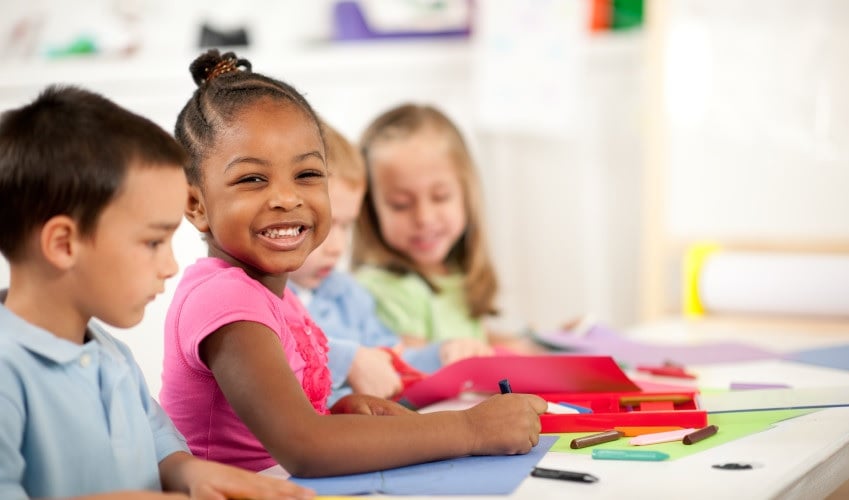The trend is worrisome and is prevalent in several high paying private schools in Nigeria. Children as young as two are given academic year goals that require rigorous concentration, a skill that is absolutely alien to them.
In one school, children, ages 2-3, were expected to know and write the numbers one through to 30 after the completion of a class meant for 2-3 year olds.
In another, kids of ages 3-4 were writing 1-300 and sometimes more.
The problem with this sort of pedagogy is multifold, education experts globally and even in Nigeria, say.
Advertisement
First, the material learned is too soon, so the method of teaching that amount of work to children of those ages will most likely include coercion since the nervous systems of preschoolers are not built to withstand long hours of concentration.
Then, the teachers easily get frustrated with having to persuade kids to stay still to learn this much amount of work that is often repetitive and rote with no opportunity for deep or rich learning.
On a closed Facebook group for teachers, several of them complained of children not being able to learn topics from the curriculum they teach. The teachers complained of parents of kids picking fights with them over administering corporal punishment on their kids for failing to pick up lessons (that are often age-inappropriate) quickly.
Advertisement
What this means is that teachers are taking out the frustration on the kids, and administering corporal punishment for behaviour that is appropriate and within their brain capacity. The kids then associate learning with discomfort, pain and stress and then the love for learning diminishes.
Precious Ajoonu, sales and marketing executive and mother, spoke about how her three-year-old was expected to write 1-100 and was often pressured to do so, mostly because her peers were already doing so.
“My child wasn’t just ready,” she said. “My child could really just count to 20 comfortably. What’s really interesting is that my child has amazing social skills and shines everywhere she goes despite not having to memorize and cram all these numbers that she cannot comprehend the importance to her world.
Advertisement
“Her communication skills are impeccable and she is a fierce little one because I am not trying to break her with all those complicated, often needless lessons.”
Ajoonu’s says she knows her child doesn’t understand quantity especially when dealing with larger figures and therefore doesn’t understand why she should be made to memorize and write exhausting repetitive work.
This is not a “child centred approach,” one other mother who didn’t want to be identified for fear her child’s school might victimise her child.
“I know it is wrong because as soon as I got pregnant, I started reading on early childhood education and the most important aspects of brain development”.
Advertisement
She says play is so crucial that the long of the amount of hours kids spend in doing rigorous amount of academic work deprives them of play- “the work of a child”.
“When I would tell the teacher, they would resist and say other kids do so and so quantity of work. I had to insist and the school reluctantly slowed down with the homework of learning to write numbers and in due time, my son who is now four years old understands the numbers and correspondence”.
Advertisement
“I encourage him through play and challenge him but never overwork him. And with less work, he is a happier child. I follow his learning pace and style and even encourage to do more challenging work,” she said.
“Challenging, never burdensome.”
Advertisement
The stories are numerous – from parents who complain of tedious homework to children who do their work, often in tears and agony, with teachers beside them pushing and pressuring them to do more.
The kids are simply getting stressed
Advertisement
Toyosi Ishola, co-founder of Camilla brook place, a play-based preschool in Yaba, Lagos, told this reporter of a girl who had attended a high achieving preschool school but had begun to loathe the school.
“I had a new three year old come in to my school and she would cry , saying ‘I don’t want to write.’ She was so scared of school that I had to let her know that she wouldn’t be writing. We (the school) didn’t even introduce writing at first. There was just a lot of colouring so that her pincer and other fine motor skills were ok. And when we introduced writing, it was through play and she sank into the activity.”
Ishola explained the little girl’s fears
“Her former school was just focusing on writing, even without proper formation.”
Children who haven’t fully developed fine motor skills and forced to write will end up having bad handwriting. They might also develop a dislike for writing and school,” Ishola said.
“We are making children associate academic with pressure. Prewriting is not the most important skill. The child needs social kill. In Nigeria, we have communication issues and conflict resolutions are lacking because we are focusing on just pre-writing and numeracy skills.”
Early childhood teacher, Tolefe Ken-Iwatuje, blames parents and untrained teachers and school owners for lessons that are not age appropriate, “uneducated and unrealistic”.
“I have had parents of three year olds expect their children to write 1-100 by when they haven’t learnt the basics,” she said.
“This is not what is important. The kids should focus on building their communication skills, their social skills, fine motor skills and coordination skills”.
She said there is also the proliferation of untrained educators and school owners who have no understanding of learning issues and styles.
According to Ken-Iwatuje, having age-inappropriate curriculum and unexpected realisations have become a marketing strategy for school owners who have to please parents to stay in business.
“It is a marketing strategy,” she said. “School owners tell parents that young kids can write to 500 etc” and adds that this makes them employ child inappropriate strategies.
It is easy to see how much work is expected of children in these high flying, academic based preschools because the curriculum in use is often borrowed.
Some of these preschools tout the British, montessori or American curriculum as their selling point and a supposed reflection of the move away from the Nigerian curriculum which mostly focuses on the abstract even though young children learn through the concrete.
But kids in these preschools, are already writing at the age of two and at age three or four; they often are already writing numbers 1-300 and more, lower and even upper case alphabets.
The British curriculum, however, expects older kids, ages five and in year one, to only begin to establish their handwriting skills.
They are taught to “sit correctly at a table, holding a pencil comfortably and correctly, begin to form lower-case letters in the correct direction, starting and finishing in the right place form capital letters form digits 0-9,” the british curriculum on handwriting reads.
Age appropriate, child centred learning
Phillipa Okonji, early childhood consultant and head, Havilah Educonsult, says preschoolers, ages 2 -5 years, undergo a lot of growth and development that they really deserve warmth and play.
“The child needs adult (s) that is supportive of their effort, warm and fosters a sense of belonging in them and is clear and consistent in setting boundaries. The adult should be knowledgeable in the growth taking place in the child and be willing to help them nurture it. This is a period in the child’s life where skills for lifelong learning and living are acquired,” she said.
Okonji’s statement is captured in this research by Adrienne L. Tierney and Charles A. Nelson 111, titled Brain Development and the Role of Experience in the Early Years.
The research also postulates “that development is a hierarchical process of wiring the brain, in that higher level processes build on a foundation of lower level processes. For example, language development depends critically on sensory and perceptual development (e.g., discrimination of speech sounds).”
Another example is that before a child is taught to read through writing and identification of sounds, the child should be exposed to an array of words to develop their oral language. These may include telling stories, reading picture books and big books, reciting rhyme and even role play.
In academic based private preschools in Nigeria, this process is hurried. Often times, a child who is two years and barely conversational, is already being taught to identify sounds and alphabets; even when a lower level process has not been fully established.
So, inappropriate methods, like yelling, child shaming and painful memorisation are then adopted by teachers.
“This reduces love for learning,” Ken-Iwatuje said.
Okonji, who is also Ken-Iwatuje’s mother, agrees.
“The preschooler learns through play to make a sense of their world. Children learn to discover, create and improvise as they play. They learn how to cooperate with other children so that they can be a sustainable part of the play. Children have their thinking challenged and they learn how to adapt to different situations that might come up,” Okonji says.
She says preschoolers need stimulating and child-friendly environment to thrive.
“Adults should make resources available in and out of doors to help children get fully involved in play. It is important that children are allowed to control their play that way, it is both enriching and challenging to them.
Through play, Okonji says, “the preschooler learns about who they are, values and where they belong from their families and adults in their lives. They learn about boundaries and rules. They learn about sharing, collaboration and cooperation from their peers.”
With support from Code for Africa.
Add a comment






